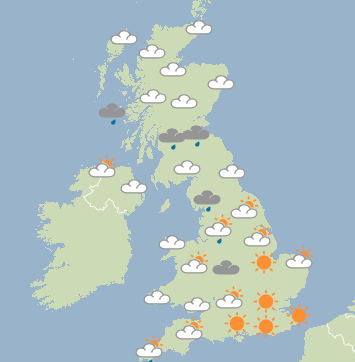 How many times do we greet another person in a week? How many times do we discuss the weather? I read an interesting article today where social anthropologist Kate Fox states that 'According to recent research, 94% of British respondents admit to having conversed about the weather in the past six hours, while 38% say they have in the past 60 minutes. “This means at almost any moment in this country, at least a third of the population is either talking about the weather, has already done so or is about to do so,”' We spend so much time talking about a topic that isn't particularly interesting, and completely meaningless, where we could be using that time to connect with the people in front of us - and possibly save a life. I hear you frowning and muttering under your voice that my last statement was a little melodramatic... So let me explain myself... In 2015 there were 6,639 suicides in the UK, this had risen from 6,581 in 2014. These numbers are only those that were officially reported to be death through suicide, and it is expected that the number would be much higher if we included inconclusive cases. So that was 6k+ people who probably also adopted the British culture of talking about the weather. I'm curious as to how many people they spoke to in the weeks/months leading up to their deaths... 'Suicide happens without warning'... This is a myth. A person contemplating suicide will most likely display behavioural whispers of despair, but for a person who is non-receptive to these, they could go unheard. Instead of talking about the weather when we interact - Why not ask how somebodies week is going? This is an open question which triggers engagement between parties, it's not as easy to spring up with a generic answer, and so provokes real life discussion, where you may learn truly, how a person is - and not just the likelihood of their garden needing a water over the weekend. How do you think a person may be feeling when contemplating suicide? How would they respond when you ask them how things are going? The person may be feeling trapped, like there is no way out. Knowing that somebody is genuinely interested in how they are, and what they have to say - could be a turning point. Always show a genuine interest, why would one open up over a passive utterance in the corridor? We would only solidify the feelings of solitary existence. Look for tell tale signs of withdrawal, feelings of hopelessness, anxiety, agitation, inability to sleep, dramatic changes in mood (including a sudden improvement following a bout of depression), increasing drug or alcohol use, or perhaps making out-of-the-blue arrangements, such as giving away possessions. The person may be open of their thoughts to suicide, or that they have been self harming. Dont be afraid that asking the person about suicide could 'plant a seed' this is also a myth; in-fact, quite the opposite is true. Asking somebody directly about their thoughts to suicide will show your concern, allowing the person to talk about their problems: which may reduce their anxiety. They will feel less isolated, and perhaps even relieved. Once somebody has decided upon a plan to suicide - it is not too late to intervene, a solution may be found by any person who shows concern and the willingness to help. Do:
If the person is refusing help, and is in immediate danger call 999. There are a number of agencies and charities who also deal with crisis, this will differ county to county. Be honest with the person about what you are doing, this may cause them to become angry or feel betrayed, but this is better than ignoring the problem, hoping it goes away and then finding out that the person has carried out their plan to suicide. I hope that when you ask the question - How has your week been going? That the person your talking to smiles and tells you how great it has been; but please, don't waste those vital moments of contact talking about the weather. |
Shoni HaswellCEO - Valued Lives Archives
March 2018
Categories |
|
Valued Lives
Unit C2 Glenthorne Court Threemilestone Ind. Est. Truro Cornwall TR4 9NY |
Tel: 0800 260 6759
Office: 01726 438673 E: info@valuedlives.co.uk Registered Charity Number 1175695 Company number 10713799 |
|
Website Navigation |
 RSS Feed
RSS Feed



